Although Team Origin’s skipper is a multihull rookie, Ben Ainslie sounded excited by the prospect of an America’s Cup in fast catamarans. “It is great to finally have an idea of the future for the America's Cup. Challenging in multihulls will be an interesting proposition for all of the teams. The game starts here.”
The game stopped a few days later, when Sir Keith decided that enough was enough: "After three years of waiting in the wings to enter a British team in the America's Cup I am bitterly disappointed that we will not be competing. However, the format and timetable decided by the Defender, BMW Oracle, is simply not viable for Team Origin.”
While the multihull announcement triggered a swift withdrawal by the Brits - and there are rumours that Italian team Azzurra is headed the same way - other established teams such as Emirates Team New Zealand are biding their time a while longer.
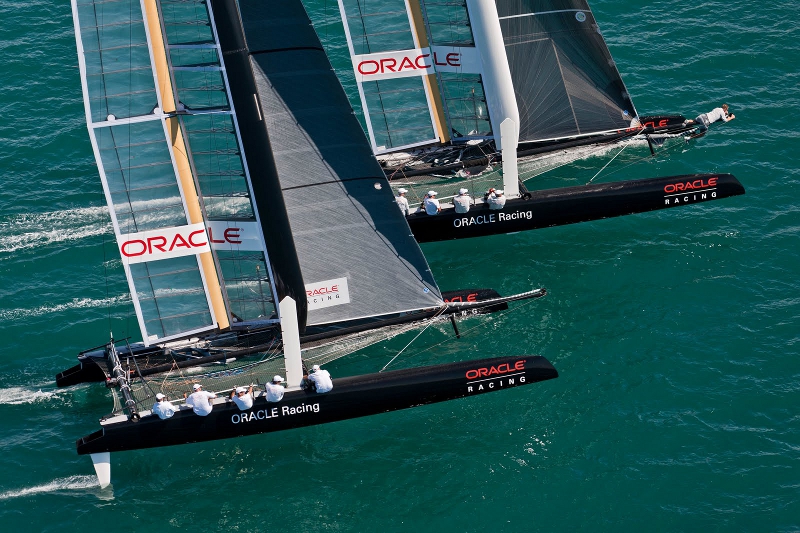
© Gilles Martin-Raget / Oracle Racing
In October, New Zealand skipper Dean Barker submitted himself to a humbling experience at the helm of an Extreme 40 in the final event of the catamaran class’s 2010 series, in Almeria, Spain. Even with the experience of multiple world and Olympic medallist Darren Bundock on board, Barker finished a long way last in the fleet. It was still mission accomplished for Barker though, as the Kiwi keelboat expert now has a good understanding of what’s required if he’s to transfer his unquestioned match racing skills into the world of fast multihull sailing. He said he was flying back to the New Zealand summer with a list of things “a mile long” that he needed to work on.
Then again, Emirates Team New Zealand haven’t yet said for definite if they’re up for competing in the new format of America’s Cup competition. The Kiwis could yet go the same way as Team Origin, although team head Grant Dalton knows it would be much harder to ever kick start the operation from scratch if they were to go into hibernation for a few years.
For any team that is serious about getting into the next America’s Cup, high on the list of priorities must be to put their name on the waiting list for an AC45 to be built. This one-design, 45-catamaran is to be a smaller sister of the AC72 that will be used to contest the America’s Cup itself.
Coutts says the 45-footer will be a cheaper and logistically simpler way for challengers to feel their way into this brave new world of twin hulls and wing masts. Time is of the essence, as there will be a five-regatta series for the AC45s to contest in 2011, while building of an AC72 will need to commence by mid next year if it’s to be launched by 2012.
Meanwhile Ernesto Bertarelli, Mr Alinghi, has been sounding out Mark Turner, head of Offshore Challenges, about running a series of races for the D35 catamarans which Bertarelli races on Lake Geneva. Turner’s company already manages the Extreme 40 circuit which, as we’ve seen with Dean Barker’s participation, is already being considered as a vital training ground for America’s Cup aspirants. In addition to his involvement as an event organiser, Turner is also talking about mounting his own challenge for the 34th America’s Cup.
The tectonic plates in grand prix racing are shifting rapidly, and they’re shifting dramatically in favour of multihulls. For the predominantly keelboat-oriented professional sailing community, it’s a case of adapt or die.

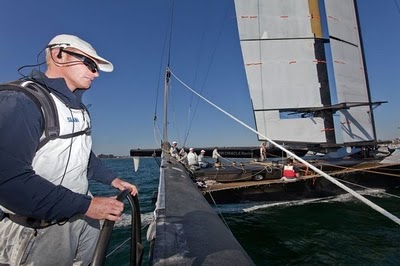 It was only last February, just a few days after BMW Oracle Racing won the America’s Cup when the mayor of San Francisco, Gavin Newsom, handed the keys to the city to one of its most famous inhabitants, Larry Ellison. Ellison returned the favour by giving Newsom a team jacket. All seemed sweetness and light between the new holders of the America’s Cup and the city of San Francisco...
It was only last February, just a few days after BMW Oracle Racing won the America’s Cup when the mayor of San Francisco, Gavin Newsom, handed the keys to the city to one of its most famous inhabitants, Larry Ellison. Ellison returned the favour by giving Newsom a team jacket. All seemed sweetness and light between the new holders of the America’s Cup and the city of San Francisco...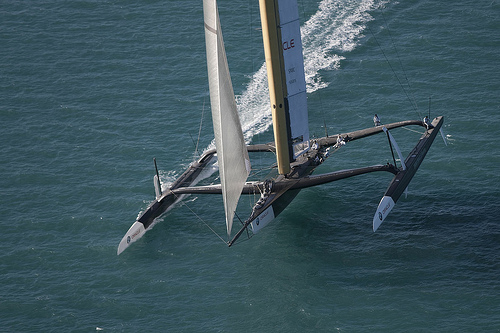 Suddenly multihulls are flavour of the month. With the next America’s Cup set to take place in 72-foot catamarans, the International Sailing Federation has now reinstated multihulls into the Olympic line-up for the Rio 2016 Games. And the boat that is now rejected from the Olympic Games? ...
Suddenly multihulls are flavour of the month. With the next America’s Cup set to take place in 72-foot catamarans, the International Sailing Federation has now reinstated multihulls into the Olympic line-up for the Rio 2016 Games. And the boat that is now rejected from the Olympic Games? ...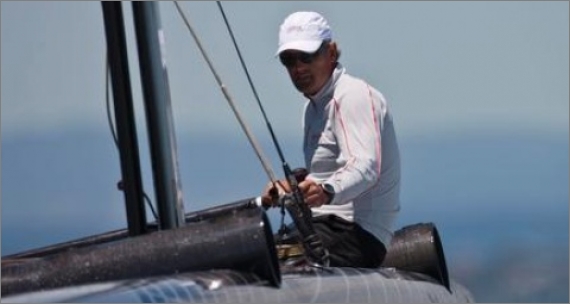 Russell Coutts has upset the applecart with his radical announcement that 72-foot catamarans will be the weapon of choice for the 34th America’s Cup. Not only that, but he’s talking about wing-masted catamarans. Sound familiar? It was a wing mast that powered BMW Oracle Racing’s trimaran to victory last February in Valencia...
Russell Coutts has upset the applecart with his radical announcement that 72-foot catamarans will be the weapon of choice for the 34th America’s Cup. Not only that, but he’s talking about wing-masted catamarans. Sound familiar? It was a wing mast that powered BMW Oracle Racing’s trimaran to victory last February in Valencia...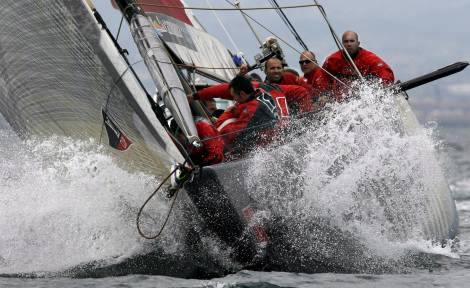 All eyes were on Team Origin at the start of the Louis Vuitton Trophy in La Maddalena, the sparse but ruggedly beautiful island off the northern coast of Sardinia. Just days earlier, team director Mike ‘Moose’ Sanderson was fired by Sir Keith Mills. It was a terse press release that announced the New Zealander’s departure, and none sounded more surprised than Sanderson himself...
All eyes were on Team Origin at the start of the Louis Vuitton Trophy in La Maddalena, the sparse but ruggedly beautiful island off the northern coast of Sardinia. Just days earlier, team director Mike ‘Moose’ Sanderson was fired by Sir Keith Mills. It was a terse press release that announced the New Zealander’s departure, and none sounded more surprised than Sanderson himself...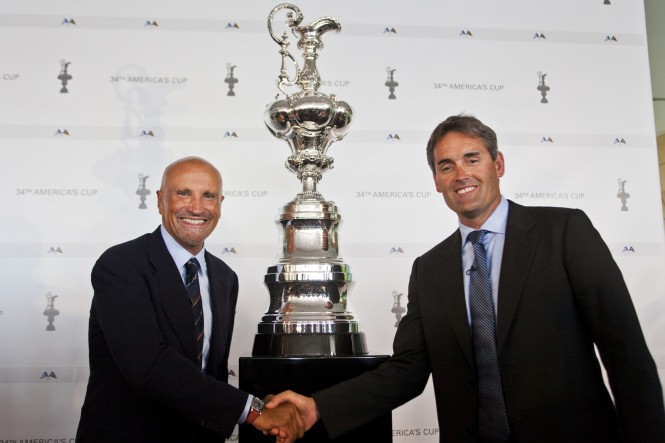 In Britain we’ve spent the last few weeks getting used to the idea of two rival political leaders putting aside their tribal enmities to form a coalition government. In the world of the America’s Cup, Sir Russell Coutts and Vincenzo Onorato are the David Cameron/Nick Clegg combo looking to straighten out a sporting event which they view as being in need of salvation after seven years of abuse by Alinghi...
In Britain we’ve spent the last few weeks getting used to the idea of two rival political leaders putting aside their tribal enmities to form a coalition government. In the world of the America’s Cup, Sir Russell Coutts and Vincenzo Onorato are the David Cameron/Nick Clegg combo looking to straighten out a sporting event which they view as being in need of salvation after seven years of abuse by Alinghi...